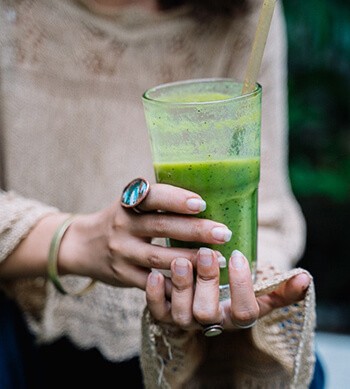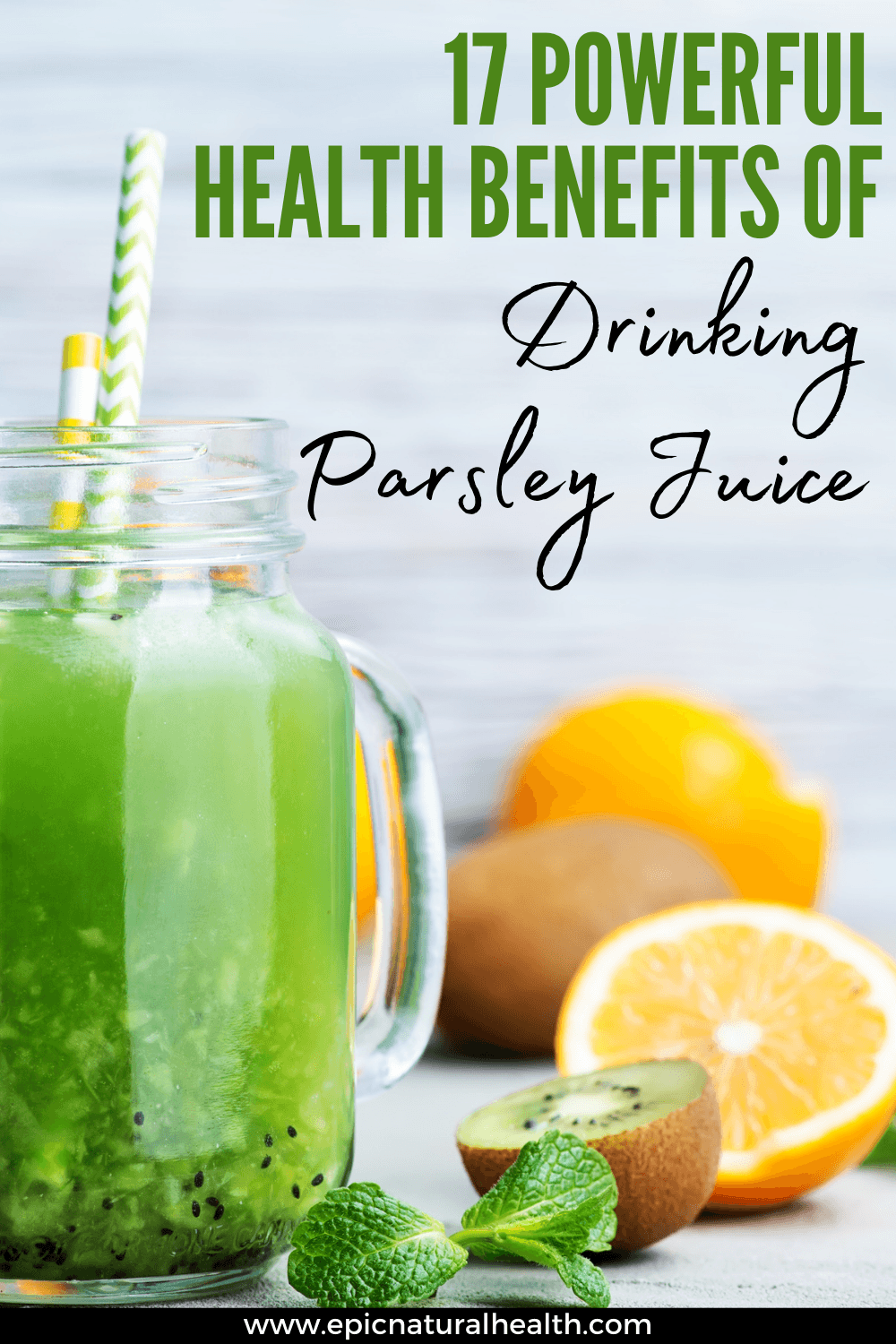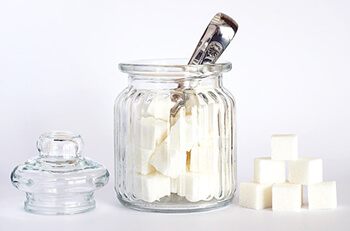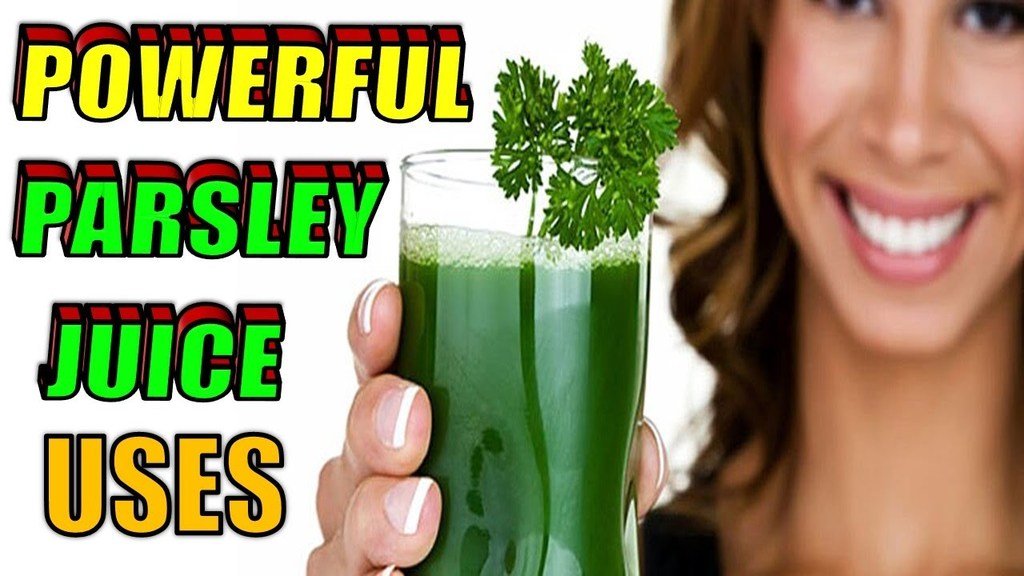Parsley is far more than just a garnish for your savoury dishes. The leaves, stems, and seeds of this Mediterranean herb are used in many recipes for health purposes alone, including parsley juice.
To make parsley juice, just combine 2 handfuls of parsley with fresh apple juice and any other greens of your choice. There are heaps of benefits you can get from the drink, including:
1. Breast Cancer Protection

Living a lifestyle that reduces your cancer risk is wise – and drinking a glass of parsley juice a day may help you to do this. Parsley contains a chemical compound called apigenin, which is known to help prevent breast cancer cell growth, and may be able to kill cancer cells and decrease the size of the tumours. Some scientists think that apigenin will work as a non-toxic treatment in the future.
Studies on cancer cells have also found that apigenin exhibits anti-proliferation, anti-inflammation, and anti-metastasis properties in colon cancer. As if that wasn’t promising enough, another anti-carcinogenic flavonoid found in parsley is luteolin. Research shows that luteolin also has preventive effects on colon cancer.
2. Fights Inflammation

It might be incredibly common, but inflammation can actually be deadly. Parsley helps because it's high in antioxidants like vitamin C, A, and E, which can help soothe inflammation. This can help reduce the risk of arthritis, an inflammation of the joints.
Parsley is also an excellent source of flavonoids, a type of antioxidant that helps reduce the risk of a number of chronic diseases, including cancer, atherosclerosis, Alzheimer's, and Parkinson's disease.
3. Makes Grilling Safer

It’s a wise idea to enjoy parsley with your char-grilled chicken, fish, and steak to help minimize the cancer-causing effects of heterocyclic amines – a type of chemical produced when proteins are cooked at high temperatures.
If you fancy a change from a glass of parsley juice, you can quickly whip up a tasty, beneficial sauce for your grilled meats by blending parsley, fresh garlic, salt, pepper, some apple cider or red wine vinegar, and olive oil together.
4. Endless Skin Benefits

Eating parsley has endless benefits to your complexion. The herb is high in vitamin C, which prevents ageing by fighting free radicals that cause oxidative stress.
The nutrient also helps reduce fine lines and wrinkles, helps in cell repair, and stimulates collagen production. This helps the skin look supple and young. Additionally, the vitamin C ion parsley can brighten the skin and reduce uneven spots. Vitamin C may also help reduce hyperpigmentation.
Parsley is rich in a variety of nutrients aside from vitamin C, including copper, zinc, manganese, calcium, and potassium, which are essential for healthy skin. The antimicrobial properties in parsley have shown promise in helping fight bacteria and reducing acne, and some research has found that parsley may help balance out excess sebum.
Finally, just when you thought we’d covered all the skin-related benefits of parsley, this impressive herb also contains antioxidants that have shown to help in reducing irritation and redness of the skin.
5. Strengthens Bones

The high vitamin K content in parsley makes it a great herb for helping strengthen the bones. Vitamin K deficiency has been linked with a higher risk of bone fracture, and a condition characterised by weak bones called osteoporosis. This is because it works with Vitamin D to regulate osteoclast production, cells in the bones that are needed for growth and healing.
Getting enough vitamin K, which just half a cup of parsley juice provides, improves your body’s ability to absorb calcium and modifies proteins in the bone matrix, both of which help improve bone health.
But vitamin K isn’t the only nutrient in parsley that supports bone health. Vitamin C, a powerful antioxidant and vitamin, is vital in the production of collagen, which is needed to make up the flexible “scaffold” of bone.
Parsley also contains bone-healthy apigenin, a flavonoid that encourages the growth of osteoblasts, cells that are needed for bone formation, and increases collagen in bone cells.
6. Helps with Digestion
If you’re dealing with stomach issues, a cup of parsley juice may be the answer. Parsley can help aid in digestion and reduce bloating and has been used as a traditional remedy for colic, indigestion, constipation, and intestinal gas.
Parsley leaves are carminative, which means they can reduce flatulence by preventing the formation of gas in the gastrointestinal tract. Additionally, they encourage the expulsion of gas, helping to quickly relieve bloating.
In this case, eating raw parsley either in a salad or sticking it in a smoothie, will provide you with the fibre you need to naturally deal with constipation.
7. Freshens Breath

Although it might not be able to kill the sulphur compounds that cause bad breath, drinking parsley juice can help freshen the breath and mask any bad odours. Parsley acts as a natural breath freshener, especially after consuming garlic or onion. Some dentists even recommend parsley as natural, healthy food for getting rid of bad breath, fast.
8. Helps with Bladder Infections
If you suffer from urinary tract infections, consider adding some parsley into your diet. Parsley juice is recommended by many doctors for people who want to naturally treat urinary tract infections and kidney and bladder stones alongside medication.
It contains chemicals that cause muscle contraction in the intestine, bladder, and uterus. This means that bladder infections and the like can be treated with regular consumption of parsley juice.
9. Fights Off Heart Disease

Raw parsley contains folate, an important B vitamin, making it effective at preventing heart troubles. Folate is involved in maintaining normal levels of the amino acid homocysteine, which is important given that elevated levels of this acid are associated with cardiovascular diseases.
Like vitamin C, folate is heat-sensitive, so you’ll best retain it when you consume raw parsley in a juice or smoothie.

10. Protects Your Eyes

Parsley is a good source of the pro-vitamin A carotenoid, beta-carotene. It also contains the carotenoids lutein and zeaxanthin.
These three difficult-to-pronounce carotenoids are essential for good eye health and help protect your vision. They also help lower your risk of age-related macular degeneration, or AMD, a medical condition that can result in blurred vision or vision loss.
The conversion of beta-carotene to pro-vitamin A in the body also helps to protect the cornea and conjunctiva, which make up the majority of the outer area of your eye that’s exposed to the elements.
11. May help regulate blood sugar

Parsley is a diuretic, meaning it increases the amount of fluid your kidneys have to get rid of over a shorter period of time. Frequent urination is a good thing, as it helps you remove excess sodium from your body, which naturally regulates your blood pressure.
Parsley is also rich in carotenoids, which have been found to benefit heart health, and can regulate elevated blood pressure and bad cholesterol levels. Additionally, parsley is a source of nitrates, which help dilate blood vessels, improving blood flow and lowering high blood pressure.
12. May boost immunity
Parsley contains many antioxidants and anti-inflammatory compounds, including flavonoids. It also contains vitamin C, an antioxidant that boosts the immune system. Not only that, but parsley contains flavanols, including kaempferol and quercetin, which have been found to fight oxidative stress and cellular damage.
13. Anti-diuretic properties
As we have briefly already mentioned, parsley is a great natural diuretic, making it a wonder-herb for lowering blood pressure, and helping flush the body of excess toxins. Its diuretic effects help eliminate excess sodium in the body, which can help rid the body of excess water weight.
A recent study found that parsley may help with urinary volume. By helping the kidneys flush out excess sodium and other contaminants, it can greatly improve the overall health of the body.
14. Prevents Anaemia
Parsley contains twice the amount of iron found in spinach. We need iron to carry oxygen in red blood cells around the body, preventing iron-deficiency anaemia.
If you’re struggling to get your daily dose of iron, studies have shown that parsley leaves have anti-anaemia properties. As an added benefit, parsley is also high in vitamin C, which aids iron absorption in the body.
Just one cup of parsley juice provides 3.7 mg of iron or 21% of your daily recommended intake. So if you juiced around 2 cups of fresh parsley, which is about 1 bunch of parsley, you’d be getting nearly half of your recommended intake of iron.
15. Speeds Wound Healing

The beta-carotene in parsley, which gets converted to vitamin A in the body, helps in the maintenance and repair of skin. This makes it a great herb to not only improve skin elasticity but speed up the wound healing process. As we definitely know by now, parsley is a great source of vitamin C, which also plays a role in wound healing.
Vitamin C encourages collagen production, and collagen can play a role in boosting tissue growth at the site of wounds, helping to heal minor injuries at a faster pace.
16. Controls Hair Loss

Hair loss is often triggered by a diet lacking in essential nutrients like vitamins A, C, D and E, zinc, B vitamins, iron, biotin, protein, and essential fatty acids. Anyone lacking these nutrients may experience slower hair growth, or worse, hair loss. Parsley is one of the best nutrient-rich herbs for supporting healthy hair growth. Including it in your diet could help prevent a number of nutritional deficiencies that lead to hair loss or weak hair.
Parsley has been used for many years as a hair tonic to control the conditions of the scalp and remedy hair loss. An antioxidant called apigenin, found in parsley, regulates a certain gene called TGF-β1, which controls hair fall.
17. Regulates Menstrual Cycles and Soothes Cramps

Parsley contains a compound called apiol, which helps regulate the menstrual cycle and soothes menstrual cramps. Some research has even found parsley may stimulate uterine contractions to induce a period, so you shouldn’t juice parsley in large amounts if you’re pregnant or breastfeeding.
Let’s not forget that parsley is a powerful anti-inflammatory, which will naturally help ease menstrual cramps. If you want to take its pain-soothing properties to a whole other level, add a little ginger to your parsley juice. The combination of these two ingredients is powerful enough to dampen painful cramping.
Conclusion

There are so many reasons to enjoy a daily drink of parsley juice in your diet. Not only is parsley packed full of nutrients, but it also boasts specific health benefits that you won’t find elsewhere. Plus, when combined with your other favourite fruits and veggies, parsley juice is incredibly tasty, so you won’t even have to suffer in the name of good health!
Just remember, when it comes to getting the most nutritional value from parsley, you should always consume it raw, so toss it straight into your juicer or blender after giving it a quick wash, and it’ll be good to go. Additionally, too much parsley can cause liver and kidney problems, so be sure to be sensible with your portioning!

